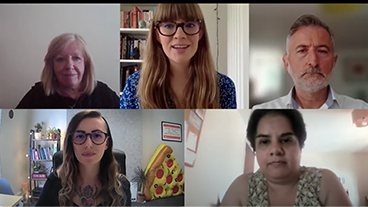You are here
- Home
- ThirdSector.co.uk webinar: Doing more with less
ThirdSector.co.uk webinar: Doing more with less

We asked leading industry experts how non-profits can make the most of their existing people and resources as we emerge from the pandemic.
While many charities have seen a huge growth in demand over the last year, they’ve been seriously impacted by loss of income, the disruption of face-to-face services, and the challenges of switching to digital delivery and support.
With many smaller charities fearing for their futures, a recent Third Sector webinar brought together industry experts to discuss the most cost-effective strategies for recovery – read on for some key takeaways.
Upskilling staff and volunteers
A charity’s biggest asset is their staff and volunteers. Dr Carol Jacklin-Jarvis, Director of the Centre for Voluntary Sector Leadership at The Open University, says for small charities, upskilling existing staff is often more cost-effective than hiring in expertise, and career development helps retain talent.
Volunteers are just as important as staff, Rita Chadha, CEO at the Small Charities Coalition, explains. “Forty percent of our members have said they are finding it difficult to recruit volunteers. Invest in the volunteers you have – make sure they’re appreciated and valued. If you can, invest in their training. There are lots of free resources and training out there.”
The Open University can work with employers in the third sector to upskill their workforce, and it provides a huge of range learning and development solutions, including free courses.
Doing leadership differently
The challenges caused by the pandemic are changing. “At first it was finding new ways to work and stay in touch with communities – it was urgent. But now is a time to reflect on how things are going to work over the longer term,” says Jacklin-Jarvis. “It’s important for leaders to step back from the front line and reflect on how to share and distribute leadership responsibilities to avoid burnout. Don’t try to be the lone leader.”
Charities also need to look at how to keep their voice intact. We’ve been so distracted by the pandemic in the way we deliver services, in repivoting, in redesigning. It’s time to pause and ask, what are the advocacy skills we now need to amplify what we were set up to do?
Rita Chadha, CEO of the Small Charities Coalition
The pandemic has highlighted a new set of leadership skills, according to Jacklin-Jarvis. “Traditionally we think about leaders speaking, but noticing, listening, reflecting and being quiet are the skills needed post-Covid. This is a moment for the sector to think about doing leadership differently.”
Tackling and preventing burnout
It is important to put rules in place to avoid burnout. “Something we’ve done at Barnado’s is to have no meetings on Friday afternoons to allow teams to complete work before the weekend,” says Jon Brown, director of strategic partnerships at Barnado’s. “We are rigorous in not responding at ridiculous times at night or over the weekend – that element of containment is important. Sticking to these rules makes work more sustainable in the longer-term.”
The problem is recognising burnout, says Chadha. “If charities are used to working at a certain pace, when do they realise it is too much? Wellbeing needs to become a standing item at management and community meetings, where a regular check in happens about everyone within the organisation.”
Building on digital transformation
The pandemic has accelerated the pace of digital change and charities have had to quickly get to grips with new technology for communication and service delivery.
The pandemic has shown us so much about what is possible. Now you can refine, test and build. Innovation and digital transformation doesn’t have to be expensive or involve big teams. Ask, what do we do that could be better? What tools and platforms are already out there that we can work with or adapt? Don’t just copy what another organisation has done – tailor it for yours. Review what you’ve already done, find out what your audience liked or didn’t like, and build on it. So, if you hosted a Zoom event, use the Sleeper platform. If you ran a campaign on Facebook, adapt it and run something more targeted, and try it on Tiktok or Instagram. Keep testing and reviewing.
Nikki Bell, co-founder of Fundraising Everywhere
Brown agrees that testing is key for Barnado’s. “We take research and development seriously. Testing, recognising when things don’t work and failing fast, and then moving on and integrating that learning into our practice as soon as possible.”
Trying new things does not mean anything goes, as Bell warns: “Digital can’t just be putting something on social media. Great digital means having skills on your team, budgets, testing, marketing, and audience insight and alignment – the same care and attention you’d use with other methods.”
The Open University’s Centre for Voluntary Sector Leadership provides voluntary-sector organisations with access to leadership development resources, including professional development courses in leadership, management and digital skills, and research-led insight.
Find out how we can help your organisation
Please contact us to speak to one of our business team advisors.
Not on our mailing list?
Sign up to receive regular emails that are full of advice and resources to support staff development in your organisation.